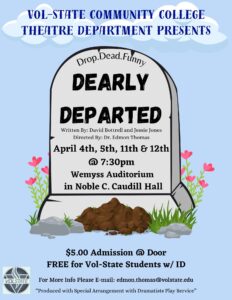Last updated on May 8, 2020

By Luis Quintanilla
Volunteer State Community College’s Jazz Ensemble recently came together to perform the song “Joy Spring.” Despite the mandated distance now required in the wake of the global health crisis and stay-at-home orders, the college’s ensemble was able to find a way to come together to perform a jazz classic.
The stage the performers find themselves in the video is not in front of rows of seats or a filled venue, instead each performer can be seen in their own personal stage: in their homes. The group performed a three-minute cover of the song “Joy Spring” by Clifford Brown via the app Acapella which allows users to record, synchronize and share songs remotely. The performance was uploaded to Vol State’s Youtube channel on April 27th.
The performance was directed by Ben Graves, Associate Professor of Music and Chair of Performing Arts at the college, and Steven Phillips, a percussion instructor at the school. Together they were joined with Gabrielle Chambers and Cynthia Hernandez on vocals, Aidan Harding on trumpet, Ladonte Hickman on clarinet, Patrick McEwan on alto saxophone, Darby Tew on guitar and Summer Wakefield on piano.
In speaking with Graves, he detailed some of the challenges not just the ensemble, but music instruction at school in general face as well as some of the added advantages brought on by adapting to the closure of campus and limited social contact.
“Private lessons for all instruments except voice can be taught remotely via Facetime, Skype or Zoom and are more successful than performance ensemble classes, but less successful than Intro to Music, which has existed online for a while, and Music Fundamentals and other theory and ear training courses. Nothing is better than face to face classes, but they’re working nonetheless,” stated Graves.
For his Jazz Ensemble class, Graves has found ways to maintain the level of instruction and performance the class normally would have despite the circumstances. “Using the app Acapella, we’ve been able to achieve remote, virtual performance. It’s far from ideal, but it challenges the students in different ways,” said Graves.
Although challenges may destabilize once stable ground, from these challenges arise the opportunity for students to adapt and learn in different ways. “The students lose the benefit of rehearsing together and the repetition that they would benefit from in that respect, but they’re gaining experience with audio and video recording and the challenge of getting a great ‘take’. They’ve also learned some great lessons about the patience required when troubleshooting technology,” Graves explains.
Steven Phillips, a percussion instructor at the school himself, weighed in on the challenges as well as highlighted the advantages the current situation has brought to musicians, both to instructors and students alike.
“I think the level of instruction is still the same, teaching and learning can happen anytime, anyplace. I do think the personal touch is missing in the fact that there is something special about the face to face especially when it comes to teaching music,” explained Phillips.
He added that even though almost anything can be learned online nowadays, there is no replacement of a teacher guiding the student face to face helping the student develop the necessary skills to master the craft. According to Phillips, this is how music, along with other disciplines, have historically and conventionally been taught and passed down.
However, since this cannot be met given an unprecedented necessity to stay apart and maintain distance from one another, Phillips stated,” The challenge is to keep it moving and try your best at everything you do.” He continued by saying, “One advantage I could see would be students and teachers are able to look in to self and examine and reflect on some things they might not have otherwise paid any attention to in the way of teaching and learning, methodologies, interpersonal and intrapersonal relationships.”
In his own classes Phillips said he has steered the direction to focus on the fundamentals, something he usually does in normal lessons anyway, but something the current situation has enhanced. “The percussion student is expected to have facility on all or most percussion instruments, this was the biggest adaptation. Having access to all those instruments right now just isn’t possible, or in my opinion of great importance,” explained Phillips.
Instead he stated students who are disciplined and willing to work to improve, will. “If the student is willing to examine the music and the exercises in this way and practice on whatever they have around pillows, boxes, the floor, side of the couch without me over their shoulder watching every tap and rebound, regardless of the situation, I think they are going the extra mile in studying and learning the craft and that’s really what it’s all about,” he stated.
Graves seemingly shares a similar sentiment. When asked if he thought students’ performances would reach the same potential as they would in face to face instruction, he admitted, “It’s hard to say. Some will get some great work done during this period, while others will lose focus. We’re in the middle of an experiment in a lot of ways.” However, regardless of the avenue or availability to perform live, Graves reiterated, “If musicians love their craft, they will always want to get better at it and perform for people.”
To those finding it difficult to find motivation to improve and work on their musical craft at the moment both Graves and Phillips offered these platitudes. “This period is a huge opportunity to focus on their instruments,” said Graves. “There are avenues for performance,” he continues, “and if you’re performing online, you could conceivably be reaching millions of people instead of the dozens in the venue you played six months ago, so the bar should be that much higher.”
Phillips weighed in by saying, “Do the best you can with what you have. If it is your intention to get better and you approach it in a disciplined way, it will happen. There are times when you just have to make yourself do it. A little bit at the time can be a good way to approach things instead of trying to have long drawn out practice sessions one day and then skipping the next few days. That doesn’t really yield results.”
There was never a plan for something like this according to Graves, nor has music instruction at Vol State ever had to be conducted fully this way, but he says he is “incredibly impressed by all the faculty in Performing Arts.” He stated the entire department, Music and Theater, and its faculty have risen to the challenge by adapting to teach their classes via Elearn and other apps like Acepella, Zoom, Skype among others.
As of right now, all summer classes in the performing arts department will be online, while there are a “few different possible models for Fall,” according to Graves as the administration is still planning.
For students hesitant to take these classes due to them being online or altered from the current situation Graves said, “There are great creative goals to be achieved via these models. Virtual and remote performance via Facebook Live, Acapella or any number of video applications are going to be even more ubiquitous in the future, so musicians and performance artists should hone their skills in these areas.”
Graves continued, “Video recording is now the norm even for musicians in many cases and requires different performance skills than just playing the music. In the case of the project Vol State Jazz completed, my ensemble has told me what a valuable learning experience it’s been. I think students might welcome the different formats given the opportunity.”
The unforeseen situation that blindsided not just the college and its instruction, but the entire world itself a couple of months ago has brought on new challenges to all aspects of life. Music, and the sharing of it, something all cultures of the world have bore witness to since millennia has not been spared this fate and has had to adapt to these challenges like anything else. However, the random concoctions of sounds, melodies and rhythms and the themes they convey that seemingly and universally fall pleasant to all human ears and move people in one way or another still remain.
“I think music has a very important place right now. Even if you can’t be at a live event, on a stage, in a studio, at the gig, or a garage with your friends and other musicians we still have a wealth of music and performances we can watch and listen to. It’s still there for you just like it always has been. Music is constantly changing, keys, chords, rhythms, instrumentation, arrangements, but the themes seem to stay the same, that being the human condition. Think about the aphorism “The more things change the more they stay the same.” The next time your listening to your favorite tune think about this just for a little bit,” concludes Phillips.





Comments are closed.